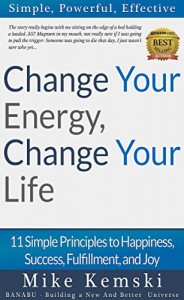

Change Your Energy, Change Your Life is a self-help book based on the author, Mike Kemski’s, life experiences. Mr. Kemski describes his childhood as one of some awful deficits: poverty, parental abuse, drug abuse, and run-ins with the law. Finally, a failed suicide attempt motivated him to rebound from rock bottom to a happy and successful life. But his rebound was not facilitated by finding Jesus or any N-point plans for obtaining wealth. It was from painstakingly figuring out what the solid principles were to living this life, and acting on them. He found 11, and explains them in this book.
What I like about Mr. Kemski’s book is the experiential nature of it. That is, he’s telling us what he discovered, how it helped him, and how we can discover and make application of the same for ourselves. What “the same” is, is a set of truths that can transform people’s lives if they become aware of them and act upon them. Doing so, systematically, puts people into a process of transformation that Mr. Kemski calls BANABU: Building A New And Better Universe. His idea is that if people use these principles to transform their lives, they’ll also be transforming other people and the world around them.
Mr. Kemski has apparently made a career of teaching these principles, which might lead you consider that the book is another infomercial. I didn’t find that to be the case, however. In my opinion, he is simply expressing some classical truths that have helped people through the ages, usually incorporated into one or another religious or philosophical system. The value of Change Your Energy, Change Your Life, is that the book pulls these truths together in an accessible and helpful way.
It’s not that Mr. Kemski is stating the obvious. It’s more like Sherlock Holmes’ distinction between “seeing” and “observing.” And becoming aware of these principles is Mr. Kemski’s first step in making use of them.
So, for instance, you may know that there is good and bad in life, but you must become aware that there is a duality of opposites in everything. When you realize this, and see it all around you and in the experiences of your life, you’ll be able to make use of it. You’ll see that negative experiences and situations can be a prompt to overcome and reach your next level. And you’ll see that solutions are to be found within problems.
And it’s the same for all the 11 principles. Mr. Kemski makes the point that the principles can be used “stand-alone” or together as a system. It seems to me that his 11 principles are actually 11 chapters in building upon a certain line of thought, and that the actual number of principles could be expressed as fewer. They would be no less the powerful, even so.
In expounding upon the principles, Mr. Kemski advances some themes that form his core philosophical views. One view is that life is mechanistic and not supernatural. That is,
…we are governed by a set of principles that we must adhere to in order to get those things [that we want].
I see this as another way of saying “we must cooperate with the universe.” But Mr. Kemski also seems to be admonishing people to not buy anyone’s snake oil. Good things and riches won’t come into your life because of happy thoughts, but because you are deliberately generating a strong, attractive energy that will bring into your life those things you need and want. But the facilitating medium for getting you those things, will always be people.
Mr. Kemski tells you how to generate that strong energy, giving you some simple exercises to do so. In fact, he provides a link to his website where you can download (for free) a workbook of exercises to help you see and utilize the 11 principles. (I have the workbook and will go through it, and probably report on my experience with it).
Change Your Energy, Change Your Life strikes me as a very practical book. It is not mystic or religious, but is a thoughtful expression of what one person has learned about overcoming adversity and despair. And as such, it is a helpful guide for the rest of us as we struggle with adversity and despair.
The practical and mechanistic nature of the book, however, make it an operational guide for living, rather than a manual for spiritual fortification. It’s like an exercise program that will build your emotional and mental muscles, but it won’t help you through times of grief or existential crisis. For such as that, you should seek other avenues. But Mr. Kemski’s book can be a very good companion text.

 2
2








